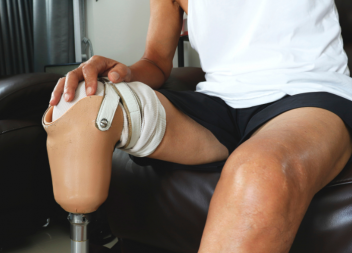Read the story of John Barton, our lovely 88-year-old client, whose GP failed to urgently refer him to hospital. He lost his leg as a result.
Details of the Amputation Claim and £150,000 Compensation for an 88-year-old War Veteran After Delayed DVT Diagnosis
John Barton, a 2nd World War veteran and widower, was just short of his 89th birthday when his case settled at the door of London County Court as Trial was about to start. Until his injury, he lived with his grown-up son in the house that had been the family home since 1954, and he was in good health, a non-smoker and teetotaller. He was able to walk 1-2 miles to do the shopping in fine weather. He was very resilient and did his own gardening and domestic tasks for both himself and his son.
On 22nd December 2004, John had finished watching telly and was getting up to go to bed when he felt a sudden, severe pain in his right leg. The Defendant, John’s GP, was called the next morning and paid a home visit at around 2:30pm. He examined John’s foot/leg whilst John was lay in bed and diagnosed John with sciatica, and prescribed pain-killing and anti-inflammatory tablets.
John therefore remained at home, in pain and in bed, using a broom as a crutch to get to and from the toilet. However on 26th December, he fell on the way to the bathroom. His son called for an ambulance and John was admitted to East Surrey Hospital where it was recognised that the circulation in his leg was severely compromised. He was transferred to St George’s Hospital where, on 28th December 2004, surgery failed to save John’s leg, leading to an above knee amputation.
The case was based around the fact that John had suffered an embolism (clot) in the right leg, causing a restriction of blood flow to his lower limb. John’s GP provided substandard care in failing to correctly diagnose and refer John urgently to hospital, at which time the leg would have been saved.
There was a factual dispute about what the GP should have found upon examination of John’s foot. Some solicitors won’t progress cases that are concerned with the doctor’s word against that of the patient. Indeed in this case, John found that after a solicitor had obtained an independent GP report, his case was rejected by his solicitors.
However, John found his way to our Director, Caroline Moore, who asked John Scurr, an eminent vascular surgeon, to comment upon what the condition of the foot would probably have been four days prior to amputation in terms of the pulse and the temperature. This crucial, evidential step made it clear that it was John’s account of how his foot appeared and felt when the GP examined him that should be preferred over that of the GP’s recorded account in the notes.
Both side’s GP experts agreed that, in the event that John’s version of events was preferred, then the Defendant was negligent; and if the Defendant’s version was preferred than there was no negligence. The overwhelming likelihood in this case was that the GP simply got it wrong; that he believed that he could feel a pulse in the foot, but if so, it was his own pulse, and he should have referred John urgently to hospital.
The case on liability was settled a few months prior to Trial, so it was just the value of John’s claim that was to be decided by a Judge. John, the ex-war veteran was ‘taking no prisoners’ on this issue and was typically stoic to the end — a perfect client!
It’s not many elderly amputees that get back on their feet, but John did and was able to walk short distances with a prosthetic leg. However, since the amputation, John was unable to go back to his beloved 2 storey home and, from July 2005, he has lived in a small, ground floor flat in a sheltered accommodation unit. His life has been dramatically altered. He lost his independent lifestyle and had to lose his precious belongings as the small flat could not accommodate such things as his type-writer and extensive book collection. He is an avid history reader.
Highly experienced barrister in the field of amputation (as well as spinal/brain injury) claims, Gerwyn Samuel, of Doughty Street Chambers dealt with the case, with Chris Hough stepping in for Trial as Gerwyn had to deal with an Inquest in another (death) case.
Amputation compensation for John
Amputation compensation was claimed for:
- the loss of John’s leg;
- the past costs of rehousing John;
- future care and future accommodation costs, with the intention of getting John moved to a private single storey apartment with a carer, where he could be reunited with his beloved book collection and looked after for his remaining life expectancy.
An offer of £80,000 was later increased to £150,000 after an additional statement had been served by John to explain in more detail his position on moving to new accommodation. Settlement was reached at the door of the court when the Claimant decided to accept the offer of £150,000 plus costs.
Upon approving the settlement, the Trial Judge in the London County Court did the following:
- He ordered a large interim costs payment, whilst rejecting the Defendant’s argument that costs equivalent to the value of the claim were disproportionate;
- He commented that 100% success fees would be appropriate in a complex case such as this that progressed to the door of the Court.
Have you experienced amputation caused by medical negligence?
If you believe you have an amputation negligence claim, please don't hesitate to contact us. Our team of specialists will listen to your medical negligence claim and start by providing free, no-obligation legal advice.






